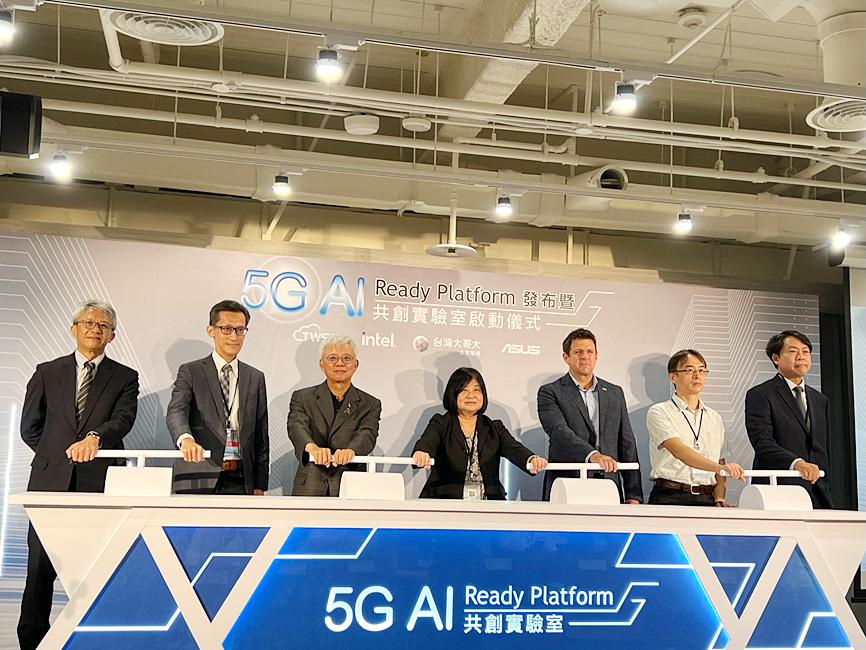Asustek Computer Inc (華碩) yesterday launched its first high-speed artificial intelligence (AI) platform to help 5G application developers accelerate program development and product readiness by adopting Intel Corp’s development tools.
Leveraging the infrastructure and a laboratory built by Asusek for the platform, software vendors would be able to develop and validate their applications easily and reduce the time needed to enter the market, Asustek said.
The platform is to operate on a private 5G network built by Taiwan Mobile Co (台灣大哥大), after the National Communications Commission last month established rules regulating the nation’s 5G private network deployment.

Photo: CNA
The rules would also pave the way for the release of new bandwidth totaling 100 megahertz for 5G private network deployment.
“The platform aims to solve pain points for start-ups, including a lack of strong computing power and high-speed 5G networks,” Asustek chief operating officer Joe Hsieh (謝明傑) told a media briefing in New Taipei City’s Tamsui District (淡水).
With supercomputers installed in the “5G AI Ready Platform,” application developers can save a large amount of time, Heish said.
It takes only four hours to come up with a data analysis model, compared with four months previously, Hsieh said.
About 100 customers are using the platform’s AI feature to develop new applications for different industries, including smart manufacturing, smart cities, smart retail and hospitals, Hsieh said.
Besides, Asustek will not rule out the possibility of investing in the startups using the platform, he said.
He expects the demand for this platform to gain traction next year, or in 2024.
Intel believes its technological capabilities lie not only in hardware, as software-oriented Intel FlexRAN and Intel oneAPI, as well as the OpenVINO toolkit would enable developers to have a common software platform where they can build their solutions, Intel general manager of Asia-Pacific and Japan region Steven Long said.
“This platform is to bring tremendous benefits to users and soft vendors so that they can easily develop, validate and deploy in greater efficiency and readiness,” Long said.
“I believe it will play a crucial role in taking Taiwan’s digital transformation forward,” he said.
Commenting on Intel’s partnerships with Taiwan Semiconductor Manufacturing Co (台積電) and MediaTek Inc (聯發科), Long said the chipmaker has formed multiple-facet partnerships with the companies, which it would expand.
He declined to comment on whether he would visit MediaTek.
MediaTek has announced a foundry partnership with Intel on mature note technology for TV and Wi-Fi chips.
Long said Taiwan is the heart of the electronics industry, as 85 percent of PCs, 90 percent of servers and more than one-third of Internet of Things devices are made in Taiwan.
“My job is to harvest that and grow it across the world at Intel’s scales,” Long said. “If COVID restrictions continue to ease, I’ll be here at least once a month. That’s how important Taiwan is to the region.”

Real estate agent and property developer JSL Construction & Development Co (愛山林) led the average compensation rankings among companies listed on the Taiwan Stock Exchange (TWSE) last year, while contract chipmaker Taiwan Semiconductor Manufacturing Co (TSMC, 台積電) finished 14th. JSL Construction paid its employees total average compensation of NT$4.78 million (US$159,701), down 13.5 percent from a year earlier, but still ahead of the most profitable listed tech giants, including TSMC, TWSE data showed. Last year, the average compensation (which includes salary, overtime, bonuses and allowances) paid by TSMC rose 21.6 percent to reach about NT$3.33 million, lifting its ranking by 10 notches

SEASONAL WEAKNESS: The combined revenue of the top 10 foundries fell 5.4%, but rush orders and China’s subsidies partially offset slowing demand Taiwan Semiconductor Manufacturing Co (TSMC, 台積電) further solidified its dominance in the global wafer foundry business in the first quarter of this year, remaining far ahead of its closest rival, Samsung Electronics Co, TrendForce Corp (集邦科技) said yesterday. TSMC posted US$25.52 billion in sales in the January-to-March period, down 5 percent from the previous quarter, but its market share rose from 67.1 percent the previous quarter to 67.6 percent, TrendForce said in a report. While smartphone-related wafer shipments declined in the first quarter due to seasonal factors, solid demand for artificial intelligence (AI) and high-performance computing (HPC) devices and urgent TV-related orders

Prices of gasoline and diesel products at domestic fuel stations are this week to rise NT$0.2 and NT$0.3 per liter respectively, after international crude oil prices increased last week, CPC Corp, Taiwan (台灣中油) and Formosa Petrochemical Corp (台塑石化) said yesterday. International crude oil prices last week snapped a two-week losing streak as the geopolitical situation between Russia and Ukraine turned increasingly tense, CPC said in a statement. News that some oil production facilities in Alberta, Canada, were shut down due to wildfires and that US-Iran nuclear talks made no progress also helped push oil prices to a significant weekly gain, Formosa said

MINERAL DIPLOMACY: The Chinese commerce ministry said it approved applications for the export of rare earths in a move that could help ease US-China trade tensions Chinese Vice Premier He Lifeng (何立峰) is today to meet a US delegation for talks in the UK, Beijing announced on Saturday amid a fragile truce in the trade dispute between the two powers. He is to visit the UK from yesterday to Friday at the invitation of the British government, the Chinese Ministry of Foreign Affairs said in a statement. He and US representatives are to cochair the first meeting of the US-China economic and trade consultation mechanism, it said. US President Donald Trump on Friday announced that a new round of trade talks with China would start in London beginning today,